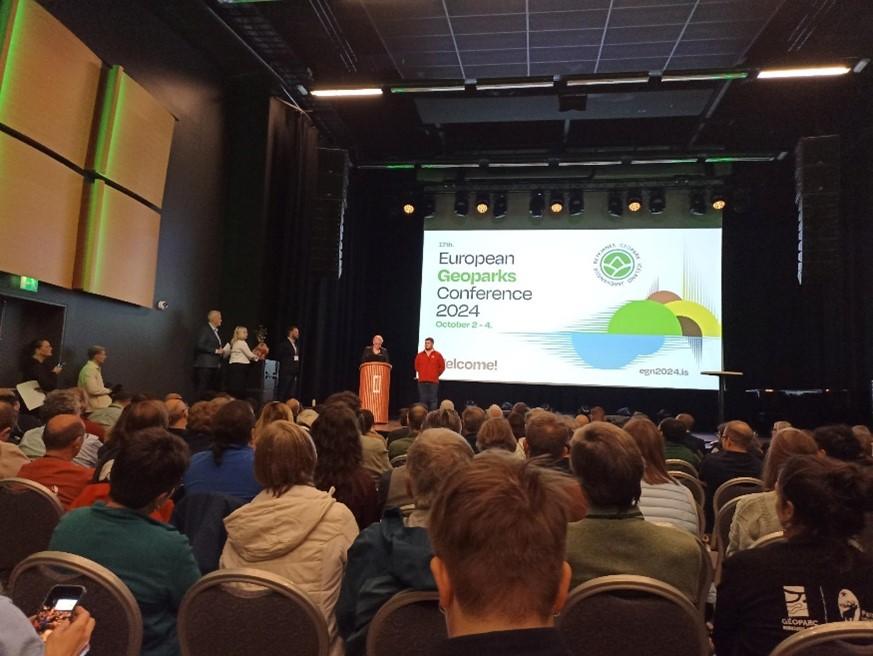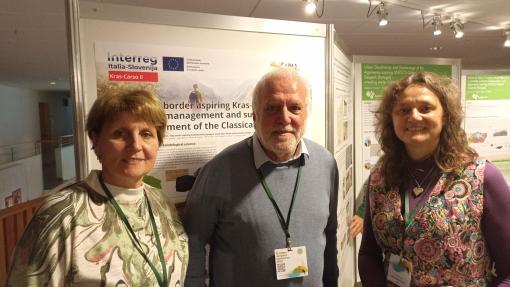The European Geoparks Network brings together 109 Geoparks from 28 countries, including two from Slovenia and twelve (together with this year's accepted candidate MurGeopark, in Puglia) from Italy. The EGN Conference, organised every two years in a different Geopark, is a unique opportunity to network with experts and specialists working in and with Geoparks across Europe. It is important for knowledge sharing, learning, networking and collaboration through projects. The conferences also pay a lot of attention to Geoparks in the making, the so-called "aspiring" Geoparks. For many years now, this has included the Kras-Carso cross-border geopark, which is being established under the Interreg KRAS-CARSO II project. In order to present the project and the activities carried out by the partners, the conference was attended by geologists Martina Stupar from the the Slovenian Institute for Nature Conservation (Zavod RS za varstvo narave) and Sara Bensi from the Autonomous Region of Friuli - Venezia Giulia, who co-authored a paper on "The cross-border aspiring Kras-Carso geopark; Joint management and sustainable development of the Classical Karst area" with the other partners of the project."
The conference lasted for 3 days and more than 400 participants from 30 countries and 100 Geoparks contributed with 240 papers on regional development, geo-tourism, sustainability, geo-pastoralism, scientific collaborations and research in Geoparks, education, innovation and the protection of geological heritage and nature in Geoparks territories across Europe and worldwide. The conference also included workshops and a number of informal meetings and social events. Representatives of the KRAS-CARSO II project actively participated in the workshops "Youth engagenent in the EGN" on the active involvement of youth in Geoparks and "The Environmental Emergency? How the Geodiversity Potential of European UNESCO Global Geoparks Can Contribute to a Resilient Future. Hands-on Insights from European Geoparks", where a debate developed between representatives from different European countries on geodiversity legislation and protection, and on the potential impact of UNESCO on the establishment of a better system for the protection of geological heritage in Europe and more generally. For the Kras-Carso geopark, the most useful workshop was the "Workshop for existing and aspiring Transnational UNESCO Global Geoparks: connecting countries and sharing stories", which brought together the four existing transboundary Geoparks included in the EGN. Each Geopark presented its operations and cross-border management methods. Two cross-border geoparks in the process of being established were also presented. The Kras-Carso geopark in the making was presented by Sara Bensi on behalf of the cross-border partners. She presented possible solutions for joint management, based on the proposals of the initial feasibility study and other studies that have been carried out with the participation of external experts in the field, both within and outside the Interreg projects, i.e. with direct funding from the Geological Survey of the Autonomous Region of Friuli - Venezia Giulia. All existing transboundary Geoparks are considered to have moved over the years from a phase of "separate" (national, each in its own part) management with a common coordinating body to a phase of joint management, also through the establishment of EGTCs, which, although providing a certain stability, have not always proved to be the best solution for the transboundary management of Geoparks. The specific governance conditions of a transboundary Geopark are also a challenge faced by the partners in the KRAS-CARSO II project. The coordinator of the group of transboundary UGGN Geoparks, Dr. Geogr. Nancy Sauer, from the Muscauer-Faltenbogen Geopark (established between Germany and Poland), offered on behalf of the EGN to support the design of an appropriate structure based on the different practices faced by cross-border Geoparks.
The last day of the conference was dedicated to learning about the Reykjanes Geopark on the ground, meeting residents from the village of Grindavik who shared their experience of the recent volcanic eruption and the Fagradalsfjall volcano area.


